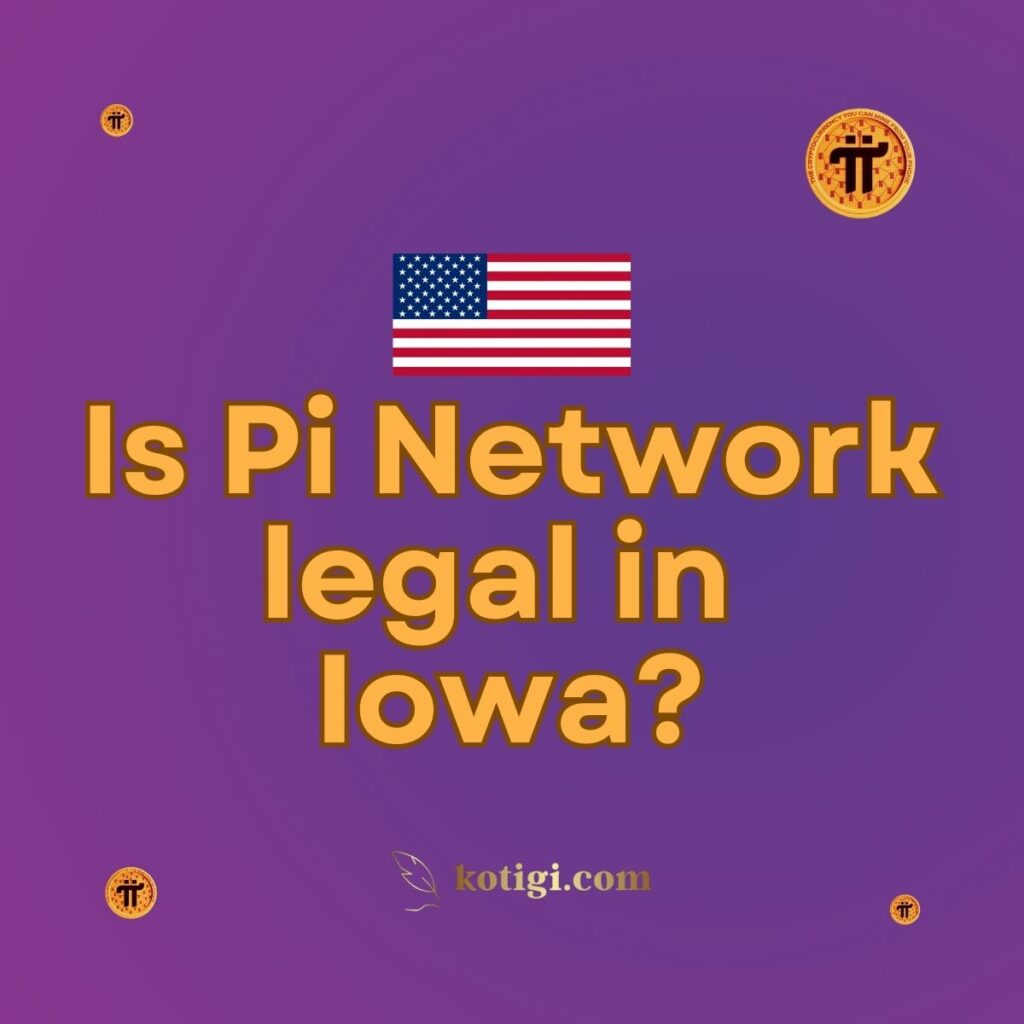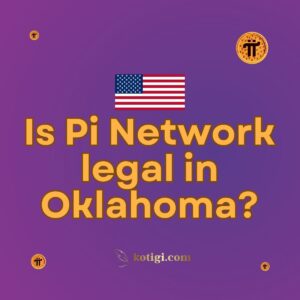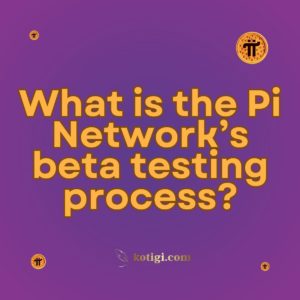
Is Pi Network legal in Iowa?
Yes, Pi Network is legal in Iowa. Iowa residents can engage in Pi Network’s mobile mining without state-specific restrictions. Participants should remain aware of federal guidelines on digital currencies and consider consumer protection laws if Pi Network tokens gain value in the future.
Introduction
With Pi Network expanding globally, Iowa residents are interested in its legal status and whether they can participate freely. Currently, there are no specific regulations restricting Pi Network in Iowa, allowing users to mine Pi tokens on mobile devices. However, Iowa participants must consider federal guidelines on cryptocurrency and consumer protection. This article explores the legal status of Pi Network in Iowa, focusing on state and federal regulations, consumer protection considerations, and what Iowa users should keep in mind.
Iowa’s Approach to Cryptocurrency Regulation
General Cryptocurrency Laws in Iowa
Iowa has taken a neutral stance on cryptocurrency, allowing blockchain and digital currency platforms like Pi Network to operate without additional state restrictions. The Iowa Division of Banking oversees financial institutions but does not directly regulate platforms like Pi Network, as it lacks a tradeable asset.
Support for Blockchain and Fintech Innovation
Although Iowa has not passed specific laws for blockchain, the state’s openness to technological innovation allows for the growth of blockchain applications. This environment makes it feasible for Iowa residents to engage in Pi Network without interference, supporting a favorable atmosphere for exploring new digital currency technologies.
Federal Regulations Impacting Pi Network in Iowa
SEC Guidelines on Digital Assets
The Securities and Exchange Commission (SEC) regulates assets considered securities, but Pi Network’s tokens are currently not classified as such due to their lack of tradeability. This distinction allows Iowa users to mine Pi tokens without federal securities registration, though this could change if Pi tokens gain value.
IRS Rules on Cryptocurrency Taxation
According to the Internal Revenue Service (IRS), cryptocurrencies are treated as property, requiring taxation on income or gains from digital assets. Currently, Pi tokens hold no market value and are therefore not subject to tax. However, Iowa participants should keep records of their mining activity in case Pi tokens gain value, which would bring them under IRS tax guidelines.
Consumer Protection and Data Security for Iowa Participants
Iowa Consumer Protection Laws
Iowa’s Consumer Fraud Act safeguards residents against deceptive business practices, a valuable protection if Pi Network’s tokens gain value in the future. Iowa participants would be able to rely on these protections if Pi Network were to introduce monetary value, providing legal recourse in cases of fraud or misleading practices.
Recommended Security Practices for Pi Network Users
Given Pi Network’s mobile platform, Iowa participants should secure their accounts through best practices such as two-factor authentication (2FA) and strong passwords. These steps help ensure that Iowa users’ accounts remain secure, aligning with state expectations for protecting personal data.
Economic and Business Potential of Pi Network in Iowa
Iowa’s Growing Tech and Innovation Ecosystem
Iowa’s tech sector is gradually expanding, showing interest in blockchain and fintech solutions. The mobile mining model of Pi Network could appeal to local businesses exploring digital engagement or blockchain loyalty programs. Although Pi tokens are not yet tradeable, Iowa businesses may consider exploring Pi Network for potential engagement purposes in the future.
Opportunities for Business Partnerships
Pi Network’s community-based model may provide businesses in Iowa with digital engagement opportunities. Though Pi tokens cannot be traded or spent, local businesses interested in blockchain could explore future partnership opportunities with Pi Network if the tokens become tradeable assets.
Environmental Considerations for Pi Network Users in Iowa
Energy Efficiency of Pi Network’s Mining Model
Pi Network’s mobile mining approach is environmentally friendly, consuming minimal energy compared to traditional cryptocurrency mining. Iowa’s commitment to sustainability makes Pi Network a fitting choice for residents who want to engage in cryptocurrency without contributing to the high energy consumption often associated with traditional mining.
Alignment with Iowa’s Environmental Goals
Iowa has prioritized renewable energy and environmentally friendly practices, and Pi Network’s low-energy model aligns well with these values. Iowa residents can mine Pi tokens without concern for high energy costs, making Pi Network an appealing option for those interested in sustainable digital practices.
Educational Resources on Blockchain in Iowa
Blockchain and Fintech Programs in Iowa’s Universities
Universities such as Iowa State University and University of Iowa offer resources and courses on blockchain, fintech, and digital technology. Iowa residents participating in Pi Network can benefit from these programs to better understand the industry and explore blockchain’s impact on finance.
Local Tech and Blockchain Events
Iowa hosts tech events, conferences, and meetups where residents can learn about blockchain developments and network with other enthusiasts. Events like the Iowa Technology Summit provide valuable insights into blockchain trends, regulations, and best practices, helping Pi Network participants stay informed about industry developments.
Legal Considerations for Pi Network in Iowa
Current Legal Standing of Pi Network in Iowa
Pi Network is currently legal in Iowa, with no state restrictions on its usage. Iowa residents can freely engage in mining Pi tokens via the mobile app, but they should be mindful of potential regulatory updates if Pi Network tokens become tradeable assets.
Possible Future Regulatory Changes
As the cryptocurrency landscape evolves, Iowa may adopt new policies aimed at protecting consumers or regulating digital assets. Any potential regulations could introduce compliance requirements for Pi Network participants in the state. Iowa residents should stay informed about these developments to ensure they remain in line with future policies.
Conclusion
Pi Network is currently legal in Iowa, with no state-imposed restrictions on its use. Iowa residents can engage in mobile mining without additional compliance concerns. However, participants should stay aware of federal regulations, particularly those set forth by the SEC and IRS, as Pi Network evolves. The state’s neutral stance on cryptocurrency, combined with its expanding tech ecosystem, creates a supportive environment for blockchain exploration. Iowa residents should follow best practices for data security, monitor potential regulatory shifts, and consider Pi Network’s low environmental impact as they participate.
Key Takeaways
- Legal Status: Pi Network is legal in Iowa, with no state-specific restrictions.
- Federal Compliance: Iowa participants should follow SEC and IRS guidelines on digital currency.
- Consumer Protection: Iowa’s Consumer Fraud Act protects residents from deceptive practices.
- Business Opportunities: Pi Network’s model offers potential for Iowa businesses exploring digital engagement.
- Environmental Benefits: Pi Network’s mobile mining aligns with Iowa’s sustainability goals.
- Educational Resources: Iowa universities and tech events offer blockchain and digital currency insights for residents.





